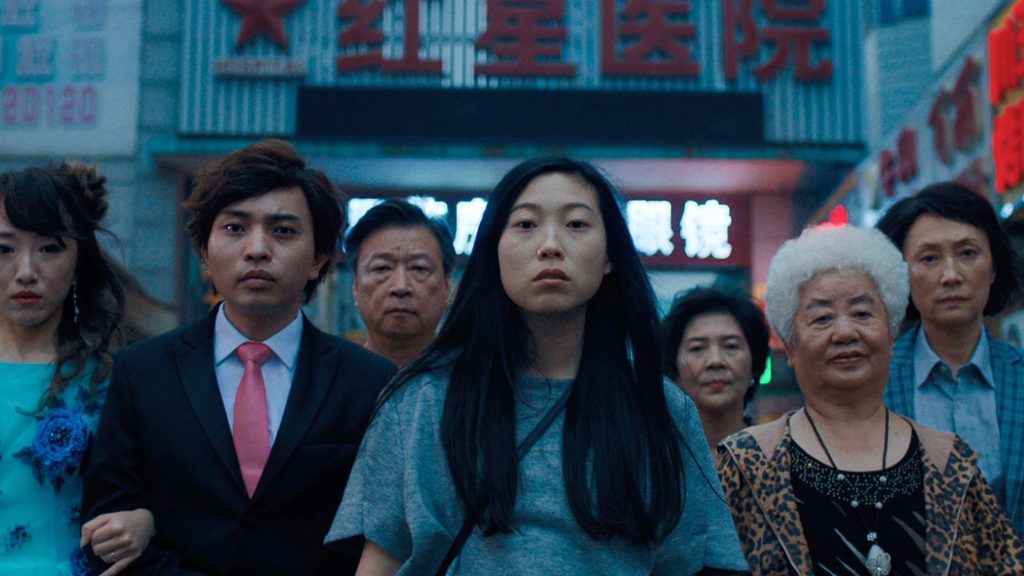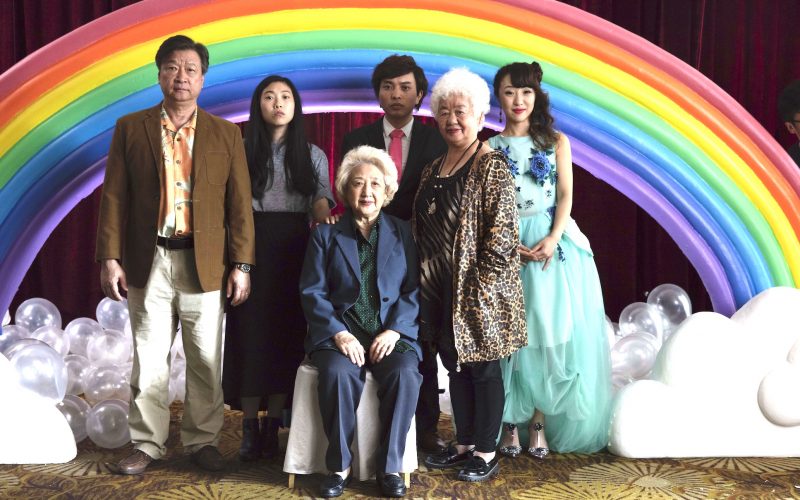The Farewell (2019).
Director Lulu Wang’s eyes are firmly on the ground in her charming, heart-warming and tenderly funny drama about family, culture, and the immigrant experience. It reaches deep into the well, exploring the bond and loyalty that remains within a family even when distance and time breaks it apart, and the tension that can result from relative estrangement. Awkwafina plays Billi, the youngest member of the family whom many haven’t seen since she was very little. The film opens in America, where Billi’s family have made their home for the past twenty-five years. So when it shifts locales, we’re not the only ones thrown out of the well and onto strange, unfamiliar land.

The premise is an amusing one; Billi’s grandmother is terminally ill, given only three months to live, and everyone except the grandmother herself knows about it. Billi is initially left out of an elaborate plan to stage a fake wedding for her cousin and his Japanese girlfriend of just three months for fear that her emotions will get the better of her and the ruse will fall apart. Despite this, Billi hops on a plane and surprises everyone with her arrival. What follows is a lengthy debate on whether it’s right or wrong to keep such a huge secret from the matriarch of the family. This grows into a conflict that’s often directly addressed, but implicitly reaches boiling point at a family dinner during which members bicker over their homeland and the insult of the implied greener pastures outside of it.
The Farewell is a film in which the whole is more resonant than its individual parts. It wears its soul on its sleeve and leaves its imprint on our skin. There’s as much that we can relate to, as western viewers, as that which we can’t, and the cultural shift is something that Billi must both combat and embrace. Hers is a fairly common kind of story albeit set in our mundane reality – she’s a child of two distinct places, and perhaps not quite feeling like she belongs to either. Her few scenes in America indicate that New York is far more a home to her than China is, and upon her arrival back to her birthplace the landmarks tower over her; cold, uninspiring in their uniformity, and unwelcoming. When they drive past what used to be her grandmother’s home, where she spent time with her late grandfather, she desperately wants to see it. She wants to see something that might make her feel comfortable.

I’m going to backtrack here, because while the film as a whole does persist more-so than its insular moments in my mind, the standout scene takes place in the latter part of the film while characters scrounge around looking for a fallen earring. It’s here that Billi finally allows herself to express how she feels about everything in a moment of heartbreaking vulnerability. The fact that she was uprooted as a child, with little warning or explanation, and the fact that the same inability to be honest and communicative to one another is the cornerstone of her extended family, becomes too much for her. It’s a sad, painful moment, the film’s best outside of Billi’s time with her Nai Nai.
Zhao Shuzhen as Nai Nai (Mandarin for grandmother) brings warmth and energy to the story. She’s none the wiser to the cause of the turmoil amongst her family, something that in and of itself is humorously morbid. Her relationship with Billi is one of deep, unwavering love, and it’s consistently painful to see the two together at such ease in each other’s company when we’re in on the secret as much as everybody else. Wang’s script goes for the gut at times with some easy, tear-jerking dialogue, such as Nai Nai’s promise of an equally large banquet for Billi’s wedding in the future. These lines deliver the appropriate punch, but they exist in a film that mostly avoids traditional opportunities to chase an emotional reaction from its viewer.

Wang’s script instead relies on the relationships and dynamics within the family to set up and deliver its sudden outbursts of human grief, sorrow and joy, where the film’s power is at its peak. It’s when Billi’s uncle, so stoic and adamant that this plot they’ve concocted is the right thing to do, breaks down in front of a crowd. It’s when Billi’s mother, a stubborn and emotionally suppressed woman who shows disdain for her daughter’s own expressiveness, begins to cry in the back of a taxi. It’s all of these moments that glimmer under the light of a harmless ruse that proves not harmless at all.
The film is a very personal one for its filmmaker. The story is based on Wang’s own grandmother’s illness, and how she was forced to straddle the line between cultures as an immigrant. While the cultural disconnect is hard to ignore for western viewers, the dysfunctional family dynamic is universal. The film is less preoccupied with death than it is with its effects on those the dead leave behind. Billi’s insistence that they need to tell Nai Nai comes from a belief that the individual deserves to know, but her uncle’s argument is a resonant one. With the option, why burden the dying with the truth when the family can carry that torch? Billi wonders whether Nai Nai deserves the option to say goodbye, but is she projecting her own desires onto a woman who may be happier to see out her final days in blissful ignorance?

The Farewell is about more than a young woman saying goodbye to her beloved grandmother. It’s about seeing her homeland for perhaps the last time and growing from the experience. She embraces her heritage but learns more about herself in the process. She’s more like her family than she would probably care to admit, capable of keeping her own secrets when it suits her desires. Awkwafina’s performance is impressively physical. It’s as much about how she emotes as it is about how she carries her body, like someone not quite ready to stand tall in her own skin and take on the world. On more than one occasion, Billi finds a bird trapped in her apartment or hotel room. In the final scene, the birds scatter from a tree into the sky when Billi exhales the way her Nai Nai taught her. She’s figured out how to spread her own wings.
It’s the kind of story that needs to be told in fresh new ways, and seeing a family divided by oceans come together to rally behind the woman who acts as its connective tissue is intimate and alluring by design. Wang pulls it off though with a nuanced brand of humour and a confidence in her performers that makes the whole thing seem naturally effortless. It’s a series of snapshots capturing the very real experiences shared by immigrants the world over, with enough warmth to pierce even the coldest of hearts.
Film ’89 Verdict – 9/10
The Farewell is on limited theatrical release now.

